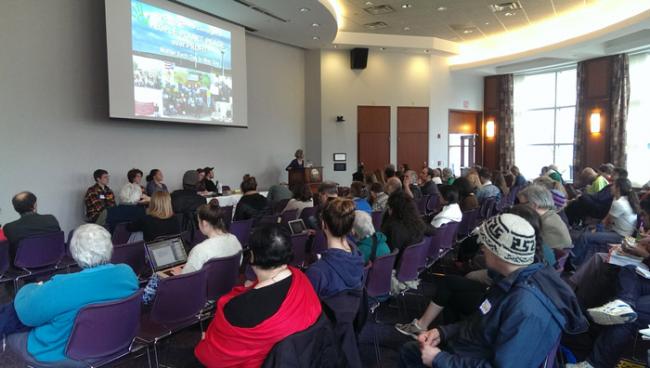Articles Menu

Amid tours of prospective students criss-crossing the Northeastern University campus, some one hundred climate justice activists from the Boston area converged on the Raytheon Amphitheater to hear an amazing assembly of intellectuals and activists discuss "race, class, and the anti-ecological logic of capitalism."
Fred Magdoff kicked off the first panel with an incisive critique of capitalism's growth imperative. Fred explained the weaknesses of other common perspectives that fail to appreciate the core nature of capitalism, which is incompatible with environmental sustainability.
Daniel Faber gave attendees a detailed look into the "pollution industrial complex" and it's corrupting influence over politics. The planet is unmistakably on a trajectory toward run-away global warming. With carbon emissions growing 3% per year, the fossil fuel industry is on track to put five times what scientists consider a safe limit into the atmosphere.
Sherri Mitchell explained how governments are violating the land use rights of indigenous peoples by poisoning the land and water through extreme resource extraction methods. She also described her work with the Land Peace Foundation to provide legal services to indigenous peoples and their allies. The defense of indigenous rights and the environment are inseparable.
Sara Mersha of Grassroots International described her work building relations with communities in the global south that are resisting environmental destruction, such as the Garifunas in Honduras. Sara also outlined a model for strategically thinking about how to move political discourse from what is possible away from false solutions and toward real solutions.
The second panel discussion was kicked off by former Green Party presidential candidate, Jill Stein with an inspirational summary of struggles from around the world that are drawing the connections between economic inequality, environmental degradation, and the unresponsiveness of undemocratic politics. Jill invited participants to build local actions for the Global Climate Convergence between Earth Day and May Day.
Kalila Barnett spoke about her work with ACE (Alternatives for Community and Environment) to build a deeper understanding of environmental justice since before it became such a popular slogan. Roxbury faces a variety of struggles where racism and classism threaten a healthy urban environment. One banner campaign of ACE is to establish a low-cost youth pass for the Boston subway system.
Peter Rugh is an independent journalist from Brooklyn, New York, who spoke about the collaboration of activists across North America to build System Change Not Climate Change, an explicitly eco-socialist coalition that can raise the demands that will be necessary for a just transition to a sustainable economy.
Ninya Loeppky discussed the work of BCAN (Boston Climate Action Network) to reduce fossil fuel dependence in the city and strengthen community resilience to climate change. They are currently working on two campaigns to have a transformative Climate Plan adopted by city government, and stop natural gas leaks that have been costing ratepayers, poisoning the local environment, and contributing significantly to the community's carbon footprint.
The panel was wrapped up by two Northeastern Students from HEAT (Husky Environmental Action Team) who described their experience growing from just a few activists into a vibrant campus coalition to promote green initiatives and energy saving on campus.
During the discussion period participants raised a variety of questions about movement tactics, false solutions, and how to talk with regular people about capitalism.
Lastly, people broke up into groups to discuss community organizing, coalition building, and other topics raise by the speakers. Jill Stein and Peter Rugh led a unified break-out group to discuss organizing local Global Climate Convergence actions and outreach at other events for System Change Not Climate Change. A sign-up sheet was passed around to organize a follow up meeting to discuss organizing details.
Jill Stein encouraged people to visit globalclimateconvergence.org to apply for grant money made available to local organizers to buy food for GCC actions. She encouraged people to think beyond demonstrations and consider hosting fun social events with some structured conversations.
After a full day of conversations, teach-in participants had built new connections and were excited to engage in community organizing campaigns
that connect social justice and climate justice. If you live in the Boston area, expect to see many follow up actions, workshops, and conversations to come out of this one day conference. Look for System Change Not Climate Change at the Boston May Day march (www.bostonmayday.org) and Wake Up the Earth Festival, May 3rd.
The primary sponsor of the teach-in was the Northeastern Environmental Justice Research Collaborative with co-sponsorship from Divest NU, Husky Environmental Action Team, and Solidarity, a Socialist, Feminist, Antiracist Organization. Equal Exchange, a fair trade co-op, donated coffee to the event.